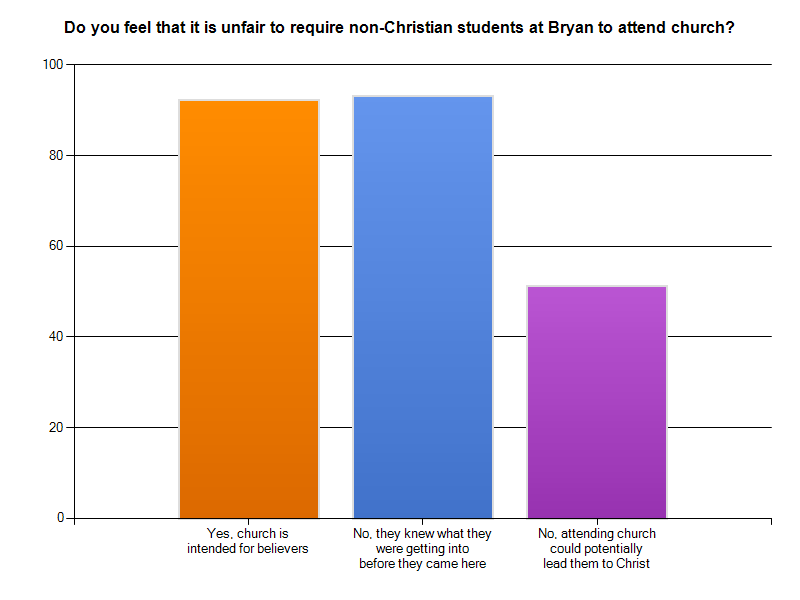by Lana Douglas
Photo Editor
The functions of the church for the believer are to provide worship, to equip him and to fulfill the great commission. While we may want to chafe against someone requiring us to go to church, this desire to get more deeply involved in a church should already be on our hearts.
While we recognize that it is good for Christians to become involved with a church, what about the non-believers at Bryan? Should we be holding them to the same rules as believers? Do the Christian-oriented rules do more harm than good when they are applied to nonbelievers? If we change the policy to accommodate nonbelievers is that fair to the rest of the student body?

Non-Christian’s and the issue of attendance
Regardless of if you are a Christian or non-Christian at Bryan, we are all required to adhere to Bryan’s policies including its church attendance policy. However if the goal of this policy is to promote spiritual growth as it is stated in the student handbook, how is it beneficial for non-Christian students?
Scott Jones, associate professor of Christian ministry, believes that Christians should not be forced to go to church, but rather they should have a desire to go on their own. But when it comes to non-Christians, they shouldn’t be expected to be a part of what he refers to as a “covenant community” because it is not intended for them.
One of the concerns of requiring non-Christian students to attend church is that it could give them a negative, legalistic view of the gospel.
“There is concern of how we come across,” said Bruce Morgan, dean of community life. “I can appreciate the concern that there is overexposure or [church attendance] is just something else on top of another requirement or we are using a church worship service as an attempt at evangelism.”
However, even with the concern that this policy could cause evangelism overload on the non-Christian students, Morgan poses this question: How do you maintain a standard for church attendance for some students and not for others?
This is an issue I feel we need to seriously consider. I, as a Christian, don’t think it is right to force non-Christians to practice a religion or become a part of a community of believers unwillingly. However, students who apply to Bryan are told specifically in the application that they will be required to attend church and chapel services on a regular basis.
“It’s not like it’s not disclosed up front, so [that] they come with an understanding and an openness [toward the policy],” said Mike Sapienza, vice president for enrollment management.
In addition to bullet points in the application which inform potential students of some of the main policies that they will be expected to follow, each applicant must submit an essay on what it means to be a Christian.
“They have to read through it, sign it and not only sign it [but] articulate why church attendance would be a positive thing for them,” said Sapienza. “…when we get responses that are either inarticulate or just incoherent, we read it and…the admissions counselor needs to follow up on this and be sure that the person understands that this is real.”
As we look to the future of Bryan College, it would be worthwhile to consider the effects of this policy on all students, especially on non-Christians. The attendance policy has the potential to deter non-Christians from true faith.
“Our campus is growing with the number of students who are not believers, and I think that [this issue] is just going to grow more in the years ahead,” said Jones.
True church attendance
We can discuss the pros and cons of the church attendance policy all day, however real change is only going to come through action. Students can try to convince Bryan College to change its policy, which could take a substantial amount of time, or students could decide to make a change on campus by altering how we view the importance of the church in our lives.
What if, instead of grudging attendance and constant complaining, the Christians on campus actually looked at church involvement as a privilege? What kind of a witness would that have to the non-Christians on campus if church was actually something that we looked forward to?
This kind of enjoyment from church can’t be achieved with the current way we look at church attendance.
Instead of mere attendance, we should view church as an opportunity to become more deeply involved in a community of believers. This could look like helping with Wednesday night services, getting involved in a Bible study, volunteering in the nursery or on service projects. Ultimately, it is a commitment to make a local church your home while you are at college.
Jones sums it up this way: the first couple of years at college are a great time to determine what type of church you wish to be involved in. The next step is to pick a church and seriously commit to going there. This doesn’t mean that you are committing to attend just Sunday morning; it is committing to becoming deeply involved in that church and its ministry to the local community.
